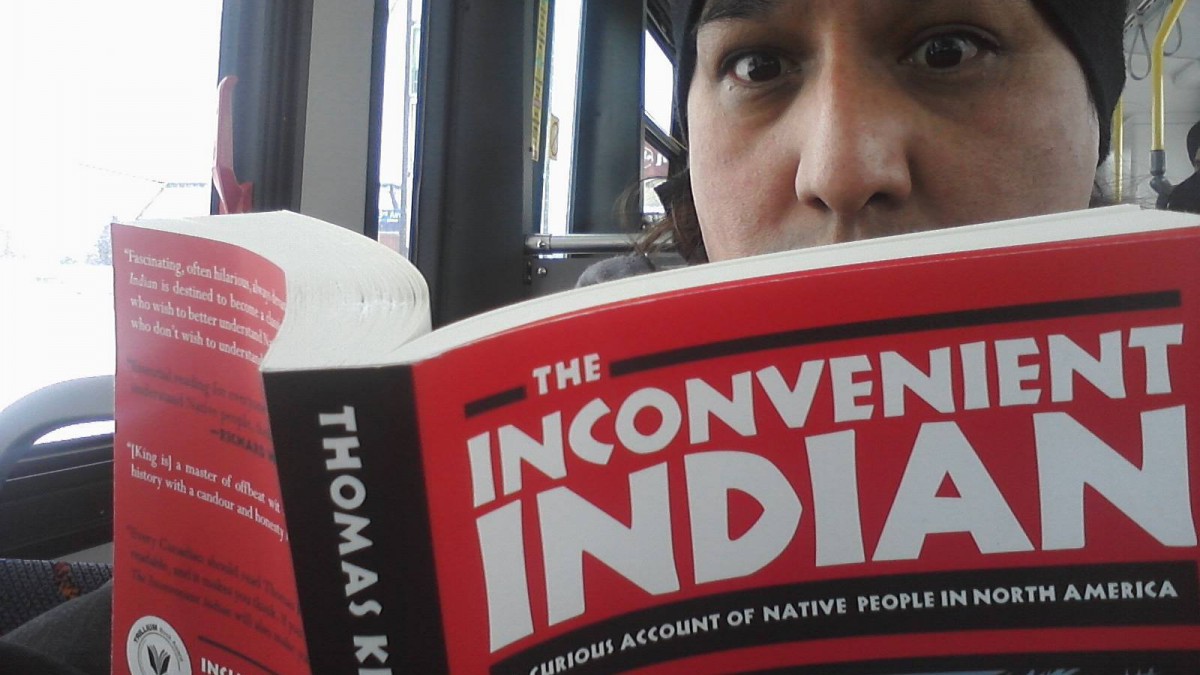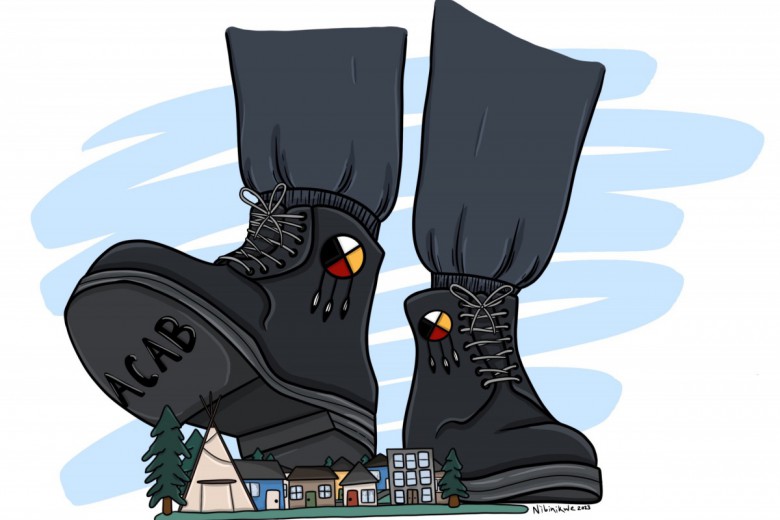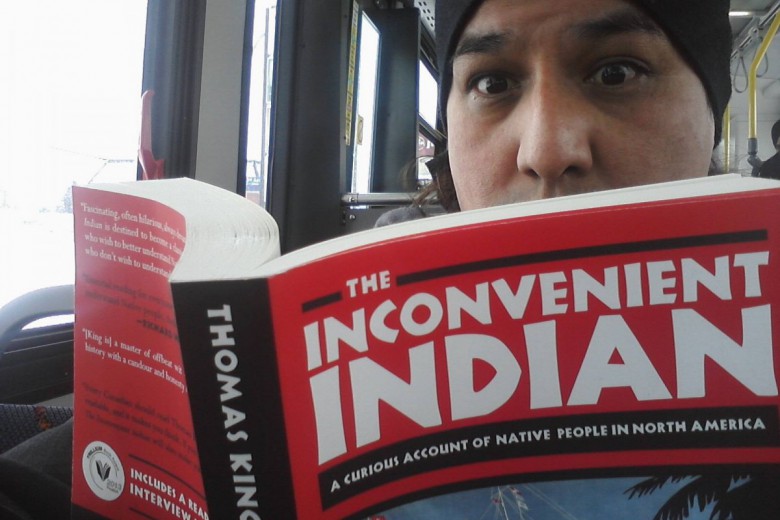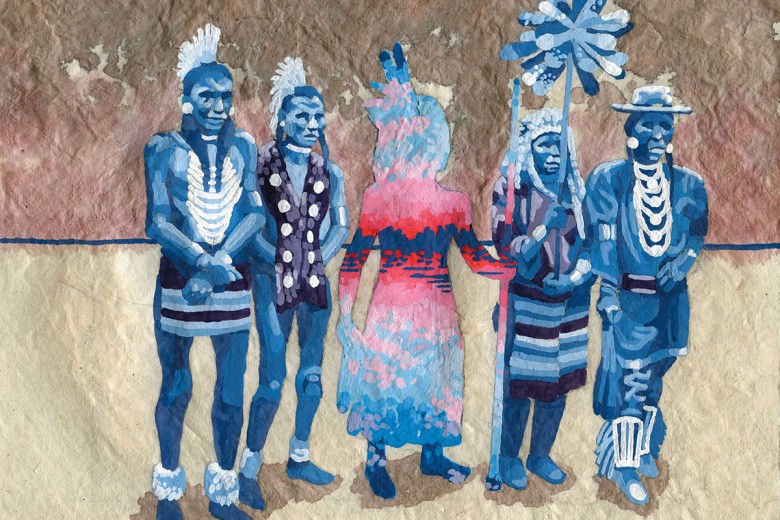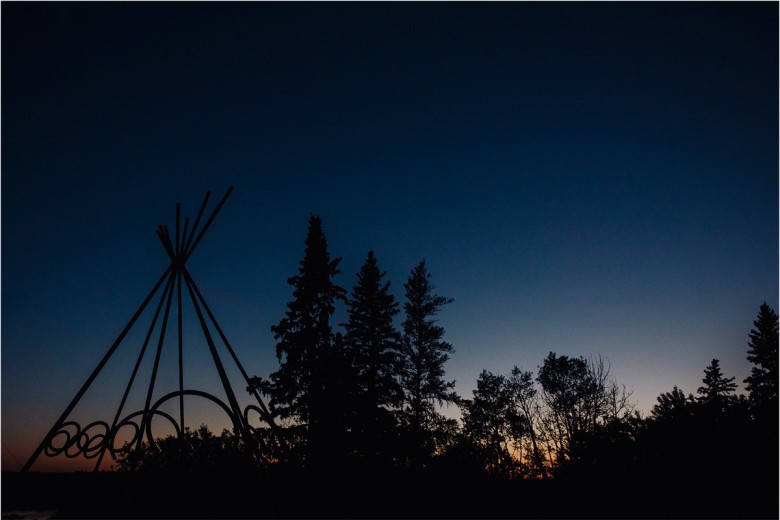Tansi, here’s the lowdown on something that happened to me on Wednesday, December 10 in Oskana (Pile of Bones), or Regina, Saskatchewan. But first, let me introduce myself.
My name is Simon Ash-Moccasin (Thomas). I am a proud Nehiyiwak (Cree person) from Saulteaux First Nation, formerly called Little Jack/Fish Lake Reserve, in Treaty 6 territory, Turtle Island. I assist in keeping two wonderful gifts form the Creator, my daughters Sage and Maija. I have a degree in education. I’ve been an actor, playwright, and slam poet, as well as a community volunteer and a board member for various organizations in the settler region called Saskatchewan. I also have some invisible disabilities. And I am a survivor of the attempted assimilation process called the ’60s Scoop.
The ’60s Scoop was the federal settler-colonial government’s attempt to assimilate Indians (I use this word for historical purposes). Basically, the government of the day noticed that the residential school process was becoming ineffective at assimilating us Indians. So, they devised a plan to go onto reserves, with the assistance of Social Services, and through the provinces, to “scoop” Indian babies off of these reserves and place them into non-Indigenous, mostly “white” (Caucasian) families. Social Services generally gave the Indian families some cockamamie excuse to take these children and babies away from their communities.
My mom was told that “They” (Social Services and the police) would hurt my father if she didn’t sign the release papers. A couple of years later, “They” (the S.S. and the police) abducted my brother right off of the street in broad daylight. My mom was pushing him in a stroller down the sidewalk and all of a sudden, two cars came out of nowhere and took my younger brother. Yet another dark stain in Canada’s history. Some estimate that half of the Scoopees have committed suicide.
It is true, that we First Peoples of this land have endured much pain and suffering in the past and it still continues today. It seems to me that the Conservative government has an unwritten policy to eradicate us, First People. Canada’s first prime minister John A. MacDonald said, “The great aim of our civilization has been to do away with the tribal system and assimilate the Indian people in all respects with the inhabitants of the Dominion.” What has changed today? How does one break the backbone of a deranged, backward system? How can an Indigenous man like me push back against the oppression and systemic racism that plagues this land that my ancestors kept and that my great-great grandchildren will keep in the future?
When the storm troopers of the colonial mindset commit acts of assault, insult, and injury against the original keepers of the land, my blood boils. I am still deeply affected by what happened to me last Wednesday. Here’s how it went.
Walking while Indigenous
I was walking home from supper when I decided to cut through Casino Regina and the Cornwall Centre mall because the sidewalks were really icy. As I was walking toward the Casino parkade door, I noticed a police officer driving toward me. I waved him on and kept walking. Another police car came by and this time the officer slowed down and drove beside me as I walked. I felt like I was being harassed and that I was being racially profiled. I waved him on and he left too. I walked on and was coming up to the parkade door when a third car circled, stopped, and the officer rolled down his window and asked where I was going. Now this has happened many times in my past when I lived in North Central (aka The Hood). And I used the same technique as then: I said I didn’t have to tell him where I was going because I know my rights. I kept walking. I got close to opening the parkade door when the officer, who was now out of his cruiser and halfway between it and me, repeated his question: where are you going?
And then things happened fast. I said, what is this about, and he said that I fit a description. I looked at what I was wearing, a green camouflage army jacket, and I thought, I bet this jacket is not part of the description. I said to him, a little louder, I know my rights. And, because I’ve recently worked with the Regina Police College as an actor in their police scenarios, I also told him he was not following proper police protocols, and I asked him what the description of the perpetrator was. By this time, in the corner of my eye, I spotted another officer. This second officer said there was a report of a stolen TV, and lightning fast he had me pressed up against the wall and it took these two cops to handcuff me. The second cop had my face pinned to the wall and I could feel his rage. The wall left a mark on my face that I have documented. It took two of them to handcuff me because in a way I needed these ones to know that they were not doing the procedures correctly.
None of my rights were stated throughout the incident, and as I was wrestling with them, I said, what the hell are you two doing? This is prejudiced and it looks like it’s racist as well. And you haven’t read me my rights. The second officer didn’t like that, and I think the first officer was taken aback by all of this, and he said he was going to go look for the TV. Crap, I thought, left alone with this mean officer and no witnesses. Officer two threw me face-first into the back of the cruiser and the right side of my body hit the car going in and my face hit the plastic seats. I said, what the hell are you doing? My legs were dangling outside the car and I was on my belly. He grabbed my legs and shoved me into the car like I was a piece of meat. I told him this is police brutality and I know my rights. Still no rights were read at this point. So, I sat in the back cursing.
He was outside pacing back and forth and I could feel pain in my left shoulder. This injury was also documented in the doctor’s report that I got the next day. As he was trying to ask me questions I didn’t respond at first, because I didn’t have to. Again, I know my rights. Plus, I thought my silence might make him realize what he’d done. Another police officer drove by and stopped to talk to the second officer who had thrown me into the cruiser. The second officer told the new officer that I wasn’t cooperating. I finally gave him my info, even though they had no right to detain me. I believe the second officer was banking on the fact that I would have arrest warrants and in his mind this would justify his behaviour. Suddenly, officer one returned and said, OK you are free to go. And I said, what, after all of that?
And I started to tell them how they handled the situation was wrong and that my rights were never read and therefore, I wasn’t even supposed to be in the back of the cruiser. And I went on telling them how my rights were violated. And officer two said, you know you are being recorded. And I said, good, and I’m not leaving until you tell your partner what you did to me. And he lied to the second officer about how he’d put me in the cruiser. And again I said, I’m not leaving. You know what you did.
Officer two was getting worked up and officer one told him to stand on the other side of the car, like they had been through this before. Officer one said he was losing his patience. Good, I said. Now you know how I feel. I also said, this is bad timing, because of what happened in Ferguson and other parts of Turtle Island. This story is not done yet. I got their names and ID numbers before I left and I went to try to make a complaint at the police station. When you make a general complaint at the police station, you’re suppose to go and talk with an officer and they will write down the complaint. Not this scenario. A superior officer who didn’t give me his name (I have his badge number) came to the lobby and escorted me to his back room.
I thought, great, I know where this is going. And he said come in and sit down, and I said, can I get a paper and pen so I can write this down as we speak because it is fresh in my mind. He said no. Have a seat. And I said again, can I write this down as we speak, and the officer then ordered me to get out and he closed the door hard. I thought, so this is how the superiors handle complaints about their own. I know this would have played out differently if I were a different skin colour.
They think they can treat us like animals and get away with it. I simply ask to be treated as a human being. On the way out I asked the officers who take common complaints what to do and finally one guy helped me out. He said, yeah, I heard everything that happened. He wants you to leave. And I said, what do I do? He told me to contact the Public Complaints office. I asked if he had the number. He told me to Google it. As I was leaving the police station, I thought, no more being a second-rate citizen on the land that myself and my ancestors keep. It is time to fight back. I have been doing that since that evening.
I went to the media right away. I sent a message to the police college. I contacted some newspapers and the radio and CBC television covered the story. I went to my doctor, got treated, and documented my injuries. I went up to Saskatoon to the Federation of Saskatchewan Indian Nations and lodged a complaint in their complaints department. I filed a complaint at the Saskatchewan Public Complaints Commission as well. And I’ve listened to countless similar stories about those same cops, and other cops too, that have gone against protocols.
The police think they can pick any First Nation person off the street, question them, rough them up, and send them on their way, without ever reading them their rights. Well, no more. Things are changing. There are new social movements emerging like Idle No More and an Indigenous population explosion is underway. The time for a new way is coming. I’d like to be one of those First People to push for the good. I want to encourage other Indigenous people to report their treatment by police. There are many people willing to help you through the process. We must refuse to be treated like second-class citizens in the lands of our ancestors.


